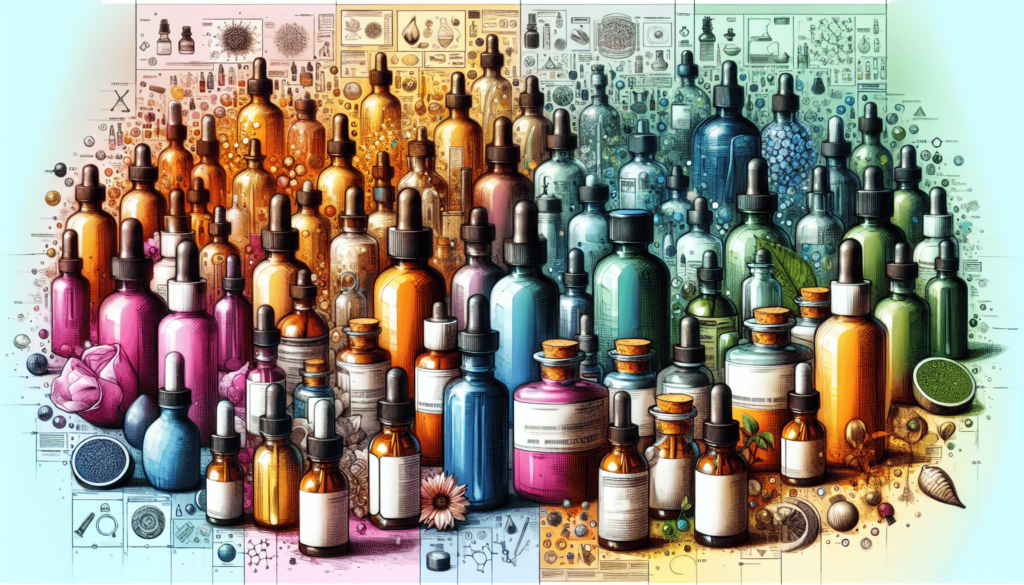Welcome to the fascinating world of holistic aromatherapy! In this article, you will explore the intricate balance between art and science in the practice of using essential oils to enhance physical, emotional, and spiritual well-being. From understanding the therapeutic properties of different oils to mastering the art of blending for a personalized scent experience, you will uncover the transformative power of aromatherapy in promoting holistic healing. Get ready to embark on a journey of self-discovery and wellness through the aromatic wonders of nature.
The Art And Science Of Holistic Aromatherapy
Have you ever wondered about the healing power of essential oils and how they can improve your overall well-being? If so, you’re in the right place! In this article, we will explore the world of holistic aromatherapy and uncover the art and science behind this ancient practice.

What is Holistic Aromatherapy?
Holistic aromatherapy is a branch of alternative medicine that uses essential oils extracted from plants to promote physical, emotional, and spiritual well-being. It is based on the belief that the aromatic compounds found in essential oils can stimulate the senses and have a positive impact on the mind and body.
Imagine being surrounded by the soothing scent of lavender after a long day at work, or feeling invigorated by the fresh aroma of peppermint in the morning. These are just some of the ways in which holistic aromatherapy can enhance your daily life and bring balance to your overall health.
The History of Aromatherapy
Aromatherapy has been used for thousands of years in various cultures around the world. The ancient Egyptians, Greeks, Romans, and Chinese all recognized the therapeutic properties of plants and used them for medicinal purposes.
In the early 20th century, French chemist René-Maurice Gattefossé coined the term “aromatherapy” after accidentally discovering the healing properties of lavender essential oil. Since then, holistic aromatherapy has gained popularity and recognition as a complementary therapy in modern healthcare practices.
How Does Aromatherapy Work?
Essential oils are highly concentrated plant extracts that capture the fragrance and therapeutic properties of the plants from which they are derived. When inhaled or applied to the skin, these oils stimulate the olfactory system and can have a direct impact on the brain and nervous system.
For example, the scent of citrus oils like lemon or orange can uplift your mood and increase energy levels, while floral oils such as rose or jasmine can promote relaxation and reduce stress. By understanding the unique properties of each essential oil, you can create customized blends to target specific health concerns or enhance your overall well-being.
The Science Behind Aromatherapy
While the concept of holistic aromatherapy may seem mystical or esoteric, there is a growing body of scientific research that supports its effectiveness. Studies have shown that inhaling essential oils can trigger neurological responses that influence emotions, memory, and cognitive function.
For instance, a study published in the Journal of Alternative and Complementary Medicine found that lavender essential oil can reduce anxiety and improve sleep quality in patients with anxiety disorders. Another study in the Journal of Pain Research showed that peppermint essential oil can relieve headaches and migraines when applied topically.

Choosing the Right Essential Oils
With a plethora of essential oils available in the market, it can be overwhelming to determine which ones are best suited for your needs. When selecting essential oils for aromatherapy, it’s essential to consider factors such as purity, quality, and therapeutic properties.
Look for essential oils that are 100% pure and free of additives or synthetic chemicals. Organic and wildcrafted oils are preferred, as they are derived from plants grown without pesticides or harmful chemicals. Additionally, consider the aroma and intended use of the oil to ensure it aligns with your specific needs and preferences.
Common Essential Oils and Their Benefits
Here are some popular essential oils and their therapeutic benefits:
| Essential Oil | Therapeutic Benefits |
|---|---|
| Lavender | Calming, Stress Relief |
| Peppermint | Energizing, Headache Relief |
| Eucalyptus | Respiratory Support, Immune Boosting |
| Tea Tree | Antimicrobial, Healing Properties |
| Chamomile | Relaxation, Sleep Aid |
By incorporating these essential oils into your daily routine, you can harness the power of aromatherapy to improve your overall well-being and enhance your quality of life.
Aromatherapy Applications
Holistic aromatherapy can be enjoyed in various forms, including:
Diffusers
Aromatherapy diffusers are devices that disperse essential oils into the air, allowing you to inhale their therapeutic benefits. Ultrasonic, nebulizing, and heat diffusers are common types that can be used in homes, offices, or spa settings.
Topical Application
Applying essential oils to the skin through massage, creams, or lotions can promote relaxation, relieve muscle tension, and nourish the skin. Always dilute essential oils with a carrier oil to prevent skin irritation or sensitization.
Bath Soaks
Adding a few drops of essential oils to a warm bath can create a luxurious and rejuvenating experience. Essential oils like lavender, chamomile, and ylang-ylang are perfect for promoting relaxation and stress relief during a relaxing bath.
Inhalation
Inhaling essential oils directly from the bottle or by creating a personal inhaler can deliver instant relief for respiratory issues, headaches, or emotional support. A few deep breaths of eucalyptus or peppermint oil can clear the sinuses and invigorate the senses.
Safety Precautions and Guidelines
While holistic aromatherapy can offer numerous benefits, it’s essential to use essential oils safely to prevent adverse reactions or sensitivities. Here are some safety precautions and guidelines to keep in mind:
Patch Test
Before applying an essential oil to your skin, conduct a patch test on a small area to check for any allergic reactions or sensitivities.
Dilution
Always dilute essential oils with a carrier oil like coconut, jojoba, or almond oil before applying them to the skin. Most essential oils are highly concentrated and may cause irritation if used undiluted.
Pregnancy and Children
Some essential oils are not recommended for use during pregnancy or on small children. Consult with a healthcare professional or aromatherapist before using essential oils if you are pregnant or have young children.
Quality
Choose high-quality essential oils from reputable brands to ensure purity and potency. Avoid synthetic or adulterated oils that may contain harmful chemicals or additives.
By following these safety precautions and guidelines, you can enjoy the benefits of holistic aromatherapy safely and effectively.
Integrating Aromatherapy Into Your Wellness Routine
If you’re new to holistic aromatherapy or looking to enhance your current wellness routine, here are some tips to help you integrate aromatherapy into your daily life:
Create a Relaxing Environment
Use a diffuser with calming essential oils like lavender or chamomile to create a peaceful and relaxing atmosphere in your home or workspace.
Personalize Your Self-Care Routine
Incorporate essential oils into your self-care rituals, such as adding a few drops of your favorite oil to a warm bath, applying a soothing blend to your pulse points, or diffusing uplifting scents throughout the day.
Mindful Breathing Exercises
Practice deep breathing exercises with essential oils to enhance relaxation and reduce stress. Inhale the aroma of a calming oil like bergamot while focusing on your breath to promote mental clarity and emotional balance.
Custom Blends for Specific Needs
Experiment with creating custom blends of essential oils to address specific health concerns or enhance certain moods. For example, blend citrus oils with peppermint for an energizing pick-me-up, or mix lavender with cedarwood for a restful night’s sleep.
The Future of Aromatherapy
As interest in holistic healing practices continues to grow, the future of aromatherapy looks promising. Researchers and practitioners are exploring new applications and innovative techniques to harness the therapeutic potential of essential oils for a wide range of health and wellness benefits.
Whether you’re seeking natural remedies for stress relief, improved sleep, or enhanced mood, holistic aromatherapy offers a holistic approach to well-being that can support your physical, emotional, and spiritual health.
In conclusion, the art and science of holistic aromatherapy provide a unique and transformative way to enhance your overall well-being and connect with the healing power of nature. By embracing the ancient wisdom of essential oils and incorporating them into your daily life, you can experience the profound benefits of aromatherapy and achieve a greater sense of balance and harmony within yourself.

